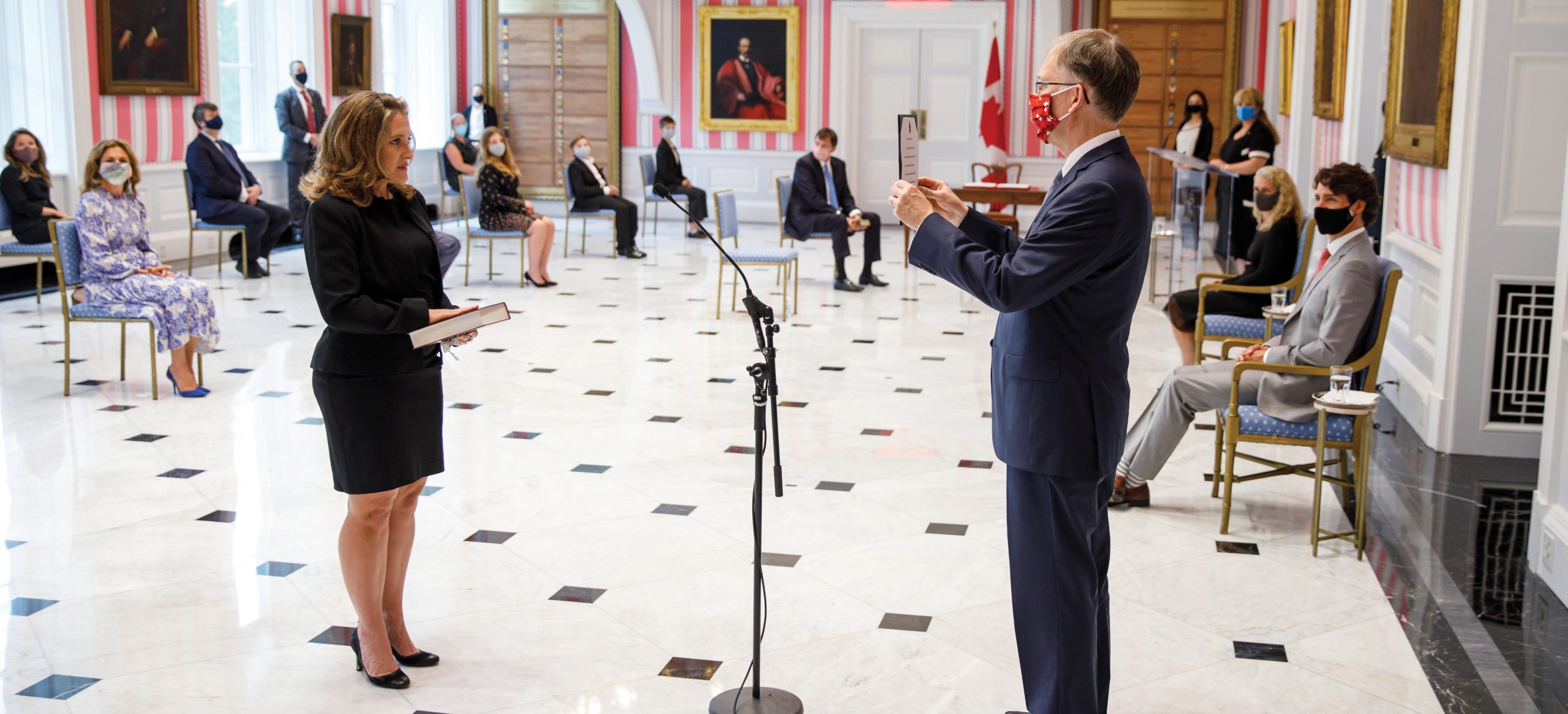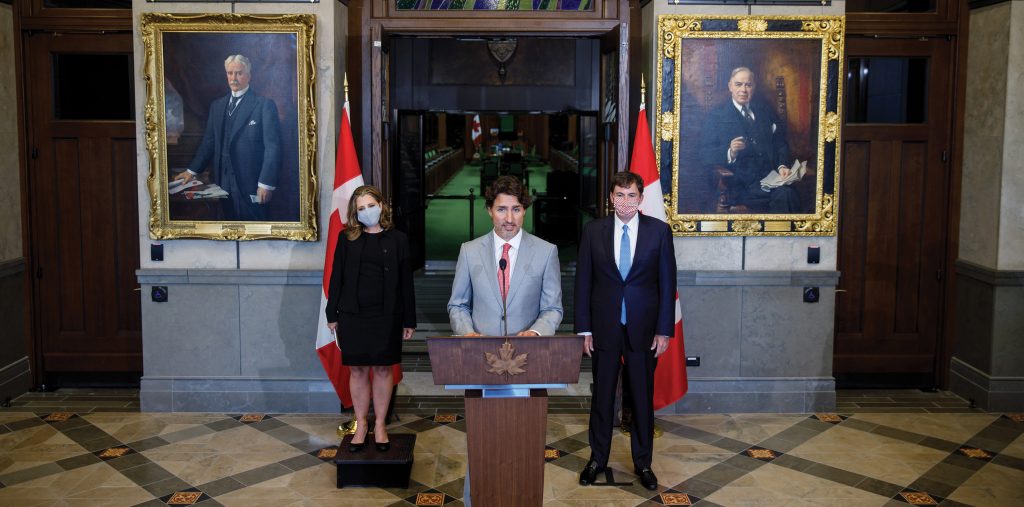The Politics of Prorogation

Proroguing Parliament is not an inherently suspect course of action. But because the 2020 prorogation by a minority government has the power to stop a precarious political narrative in its tracks, this prorogation can be interpreted as a highly political gambit. The intersection of the WE scandal with the reality of the Trudeau government’s vulnerability provides an opportunity for reflection on the potential use of prorogation as a political tool.
Lori Turnbull
During the COVID-19 lockdown, the political landscape was far less adversarial than usual. Governments announced financial aid packages and emergency measures, usually with the support of opposition parties, and political conflicts were generally put on hold as the country was focused on stopping the spread of COVID-19.
The WE controversy brought a somewhat abrupt end to this political détente. In late June, Prime Minister Justin Trudeau announced that the WE Charity would administer a federal student grant program that would provide students with paid volunteer opportunities across the country. These positions were meant to provide help to students during the financial crisis and to replace some of the internships and coop placements that had been lost.
The selection of WE for this responsibility raised eyebrows immediately, given the prime minister’s known connections with the organization and its founders, Marc and Craig Kielburger. Trudeau has appeared on stage at WE events several times in the past, as have his wife, Sophie Grégoire Trudeau, mother Margaret Trudeau, and brother Alexandre Trudeau. Margaret Trudeau received $250,000 in speaking fees and her agent 20 per cent more for 25 speeches over five years, while the PM’s brother Sacha received $28,000 plus agent’s fees for seven speeches in a two-year period, while the PM’s wife was involved as a goodwill ambassador for WE, which understandably reimbursed her travel and accommodation costs.

During the lockdown period, opposition parties were between a rock and a hard place: on the one hand, it is in the public interest that unprecedented levels of government spending be met with the closest opposition scrutiny; on the other, an economic and public health crisis is not the time for the opposition to be seen to be playing politics or questioning government efforts to stabilize the economy and enforce public health measures.
Therefore, in the darkest days of the pandemic, opposition criticism was subdued. But the WE story came at just the right time for them, when provinces had started reopening their economies, shops and restaurants were doing business again, and social distancing restrictions were still in place but nowhere near as strict. As the data showed that government efforts to flatten the curve in Canada had been effective, opposition parties could get back to business as usual.
The House of Commons Standing Committee on Finance as well as the Committee on Access to Information, Privacy and Ethics have both been investigating the circumstances around the decision to enter into a contribution agreement with WE Charity to deliver the Canada Student Service Grant (CSSG) program, which would have connected students with volunteer opportunities that would have paid between $1000 and $5000. Witness testimony revealed a lot. Clerk of the Privy Council Ian Shugart and other senior public servants testified that the recommendation from the public service was to have WE deliver the program, that no other organization including the public service was in a position to do this, and that there was no political interference in the advice. However, government documents that have been released in connection with the story have raised new questions about communications between the Kielburgers, the office of now former Finance Minister Bill Morneau, Minister of Small Business Bardish Chagger, and the Prime Minister’s Office. Committee testimony from Morneau was particularly explosive; he told the committee that, on the morning of his testimony, he wrote a cheque to the WE Charity for over $41,000 to close the loop on expenses related to two trips that he and his family took with WE, for whom one of his two daughters served as a volunteer while the other worked as a contractor.
Part of the opposition’s strategy has been to drill down into vulnerabilities in the WE organization itself; after all, the worse WE looks, the harder it is for the government to defend the choice to trust them with the CSSG program. The public learned in testimony from Michelle Douglas, former board chair at WE, that the executive was not transparent with the board about the organization’s finances, which led to her resignation.
The internal structure of the WE organization, and the relationship between the charity and the profit-making social enterprise, is unorthodox to say the least. Charity Intelligence, an independent organization that assesses the impact of charitable donations, has raised questions about WE’s financial practices.
On the day that Morneau was replaced by Chrystia Freeland in the Finance portfolio, the prime minister also announced that Parliament would be prorogued until September 23. This means that the committees’ meetings and queries will stop, at least in the formal sense, until late September.
As many commentators have pointed out, this decision might prove to do more harm than good to the government. All prorogations land somewhere on the following continuum: at one end, there are truly benign, routine prorogations designed to allow a new Speech from the Throne when a government begins a new phase of its mandate; on the other end, there is the example of December 2008 when Prime Minister Stephen Harper sought a prorogation to avoid a confidence vote that his minority government was sure to lose.
This one isn’t as bad as that, but it’s not good. And it is surely at odds with Trudeau’s party’s 2015 pledge to do government differently in the use of prorogation. There is no reason to prorogue other than to shut the committees up. The lightly-shuffled Trudeau cabinet could have “reset” its priorities even as committees kept meeting. That said, even with the prorogation, newly-released government documents raise new evidence and questions that will make it difficult for the government to reset the minds of the public.
There will likely be an election at some point in the next 12 months. With a new leader, the Conservatives will have to choose whether to try to make the government’s ethics record the key election issue, or whether they will instead focus on a broad vision for Canada that provides a true alternative to the Liberals. Chrystia Freeland’s appointment as finance minister could mean a shift to the left for the government, which could potentially open up space for the newly-branded Conservatives. It is possible that the next election will feature a true choice between competing scenarios for a post-COVID Canada.
Contributing Writer Lori Turnbull, a co-winner of the prestigious Donner Prize, is Director of the School of Public Administration and Associate Professor at Dalhousie University.
